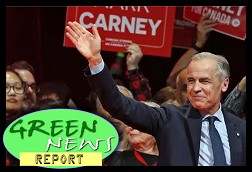[Ed Note: The author appeared with me last night, as I guest hosted the Mike Malloy Show. We discussed the following article, as well as his other recent piece examining the dangerous scam of U.S. corporate welfare as military "foreign aid" in Egypt. You can now listen to that interview here. - BF]
Guest blogged by Ernest A. Canning
 As Vermont becomes the first state to consider a Constitutional amendment that would put an end to "corporate personhood", it is perhaps worthwhile to examine the historical context in which the concept arose and the forceful challenges to its validity that have been mustered by a minority of Supreme Court Justices.
As Vermont becomes the first state to consider a Constitutional amendment that would put an end to "corporate personhood", it is perhaps worthwhile to examine the historical context in which the concept arose and the forceful challenges to its validity that have been mustered by a minority of Supreme Court Justices.
Supreme Court Justice Sonia Sotomayor created a stir when, during oral arguments in Citizens United vs. Federal Election Commission, she not only questioned the validity of the corporate challenge to limits on campaign spending but questioned a legal doctrine which dates back to an 1886 decision, Santa Clara County vs. Southern Pacific Railroad Co. She observed that it was the courts who "created corporations as persons, gave birth to corporations as persons," and that "an argument" could be made "that that was the court's error to start with...[imbuing] a creature of state law with human characteristics."
Sotomayor, whose position was not included in Justice John Paul Steven's dissenting opinion in Citizens United --- a dissent she signed onto --- is by no means the first Supreme Court Justice to question the legitimacy of a long-standing doctrine of U.S. corporate law which has served to undermine the very fabric of individual liberty and democratic accountability, permitting wealth, power and control over mass communications to be concentrated in the hands of the privileged few.
Earlier dissents from Justices Hugo Black and William O. Douglas not only challenged the legitimacy of extending to corporations Constitutional rights intended to protect the living, breathing human beings who make up our nation's citizenry but exposed the hypocrisy of the activist, Federalist Society Justices, who claim to be "strict constructionists," but who are, in fact, as we've reported previously, part of a corporate-funded, counterrevolution in law...
Judicial activism, corporate 'personhood' and the Gilded Age
As described by Kevin Phillips in Wealth and Democracy, the period after 1865 is often referred to as the Gilded Age.
Contrary to laissez-faire and Social Darwinist mythology, during the latter half of the 19th Century, Phillips writes, "corporations and railroads took their favors --- enormous ones that helped produce the world's biggest fortunes --- by all but seizing key portions of federal and state governments. The legitimate encouragement of industry and technology aided U.S. growth and democracy; these political usurpations fundamentally threatened it."
He explains that...
The 1886 decision in Santa Clara County vs. Southern Pacific Railroad Co. was the product of judicial activism searching for a means to place the rights of corporate wealth and power over the power of individual states to protect the health, safety and welfare of their citizens, though as noted in comments, "corporate personhood" was actually established not by the body of the court's opinion but by the decision by the Supreme Court's reporter, J.C. Bancroft Davis, to insert statements made by Chief Justice Morrison Waite during oral arguments into a headnote.
As observed subsequently by Justice Douglas in Wheeling Steel Corp. vs. Glander (1949), "It has been implicit in all of our decisions since 1886 that a corporation is a 'person' within the meaning of the Equal Protection Clause of the Fourteenth Amendment. Santa Clara Co. v. South. Pacific R. Co...so held. The Court was cryptic in its decision. It was so sure of its ground that it wrote no opinion on point, Chief Justice Waite announcing from the bench:"
Today, at the height of a second Gilded Age, which has produced the greatest disparity in wealth in the history of this nation, we also find ourselves at the end stage of what has been apply described, as a "counterrevolution in law" in which a concerted effort was made to pack the courts with radical right-wing jurists from the Robert Bork-founded, billionaire-funded Federalist Society, whose core purpose is to insure political as well as economic inequality.
Historic challenges to the 14th Amendment "rights" of corporations
"I do not believe the word 'person' in the Fourteenth Amendment includes corporations."
--Justice Hugo Black, Dissenting, Connecticut General Life Ins. Co. vs. Johnson (1938)
There is perhaps no American jurist more deserving of the label "strict constructionist" than Justice Hugo Black. In a 1959 concurring opinion in Smith vs. California, Black, in examining the language of the First Amendment --- "Congress shall make no law...abridging the freedom of speech, or of the press" --- wrote, "I read 'no law...abridging' to mean 'no law abridging.'"
In New York Times vs. United States (the 1971 "Pentagon Papers" case), it was Justice Black who admonished that the First Amendment protected the press so that it could serve "the governed, not the governors...The press was protected so that it could bare the secrets of government and inform the people. Only a free and unrestrained press can effectively expose deception in government. And paramount among the responsibilities of a free press is the duty to prevent any part of the government from deceiving the people and sending them off to distant lands to die..."
Had Justice Black lived to decide Citizens United, there can be no doubt that he would have dissented from the majority ruling of the five Republican-appointed Justices who determined a campaign finance law could somehow violate the First Amendment "free speech" rights of corporations.
In Wheeling Steel Corp. vs. Glander (1949), Black signed onto a dissenting opinion by Justice William O. Douglas, which tore into the "cryptic" rationale employed by the Court in its 1886 assumption that the Fourteenth Amendment applied to corporations, which assumption, Douglas and Black opined, was not supported by either history or logic.
Both Douglas, in Wheeling Steel, and Black, in Connecticut General Life Ins., turned to the language of the Fourteen Amendment:
Douglas concluded: "'Persons' in the first sentence plainly include only human beings, for corporations are not 'born or naturalized.'" He also opined: "Corporations are not 'citizens' within the meaning of the first clause of the second sentence."
Still in need of a Constitutional amendment
While Justice Sotomayor's willingness to challenge the assumption that state-created, artificial entities --- corporations --- are "persons" entitled to Constitutional protections is appropriate, hers will be the minority view on the Court for the foreseeable future.
Democratic governance cannot be attained without an amendment to the Constitution, employing language along the simple but elegant lines offered by John Wilkens, a reader of The BRAD BLOG:
Vermont State Senator Virginia Lyons (D) has taken the first step by introducing a resolution, drafted in part by former 2004 Green Party Presidential candidate David Cobb, proposing "an amendment to the United States Constitution...which provides that corporations are not persons under the laws of the United States."
The problem is that this method of amending the U.S. Constitution requires that two-thirds of state legislatures call on the U.S. Congress to open a national convention to propose the amendment. That method has never previously been utilized.
The alternative is for two-thirds of Congress to vote in support of a proposed Constitutional amendment. While that method is unlikely given the current Republican majority in the House, it could perhaps become a feasible method if it were made a central issue of the 2012 campaign.
CORRECTION: This article had originally opened with a quote said to have been from Abraham Lincoln in 1864, decrying the growth of corporations following the Civil War which, he said as we quoted, would lead to "an era of corruption in high places" and "wealth...aggregated in a few hands" until "the republic is destroyed."
In fact, that quote, though cited thousands of times over the last sixty years after appearing in Archer H. Show's 1950 Lincoln Encyclopedia in a letter said to have been written by Lincoln is, according to research by Snopes.com, an apocryphal one. The letter from which it is taken, the website explains, appears to have been a forgery, though a convincing one, as the former President had, at other times, noted his support of labor, as in his 1861 message "Labor is prior to, and...superior to capital."
We thank the readers who brought this error to our attention, and have removed the quote from the article above. Of course, we regret the error.
UPDATE 2/10/11: Recognizing that it entails a “long-term campaign that will require the participation of groups across the country to be successful, Move to Amend has created a Local Action Toolkit that “provides guidance on how to organize in your local community, region or state” as part of the implementation of a successful campaign.
UPDATE 2/12/11: Democracy in action: Senator Bernie Sanders (I-VT) has scheduled a town hall meeting on corporate personhood for Sat., 03/05/11 from 2:00 p.m. to 4:00 p.m. at the Montpelier High School Auditorium in Montpelier, VT.
Ernest A. Canning has been an active member of the California state bar since 1977. Mr. Canning has received both undergraduate and graduate degrees in political science as well as a juris doctor. He is also a Vietnam vet (4th Infantry, Central Highlands 1968).


 Mad World:
Mad World: 'Green News Report' 5/15/25
'Green News Report' 5/15/25
 Plane Corruption and the Future of the DOJ:
Plane Corruption and the Future of the DOJ: 'Deeply Evil Stuff': GOP House Proposes Largest Medicaid Cuts in History: 'BradCast' 5/13/25
'Deeply Evil Stuff': GOP House Proposes Largest Medicaid Cuts in History: 'BradCast' 5/13/25 'Green News Report' 5/13/25
'Green News Report' 5/13/25 And Then They Came for the Mayors...: 'BradCast' 5/12/25
And Then They Came for the Mayors...: 'BradCast' 5/12/25 Sunday 'New Guy, Old Guy' Toons
Sunday 'New Guy, Old Guy' Toons Blowing Smoke.
Blowing Smoke. 'Green News Report' 5/8/25
'Green News Report' 5/8/25 SCOTUS Weighs 'Disastrous' Public Funding of Religious Schools: 'BradCast' 5/7/25
SCOTUS Weighs 'Disastrous' Public Funding of Religious Schools: 'BradCast' 5/7/25 Trump Judge Blocks NC GOP Theft of 2024 Supreme Court Seat: 'BradCast' 5/6/25
Trump Judge Blocks NC GOP Theft of 2024 Supreme Court Seat: 'BradCast' 5/6/25 'Green News Report' 5/6/25
'Green News Report' 5/6/25 Prosecutors Quit After U.S Attny Strikes Deal With Felon Cop: 'BradCast' 5/5/25
Prosecutors Quit After U.S Attny Strikes Deal With Felon Cop: 'BradCast' 5/5/25 Sunday 'Good Buy, Dolly!' Toons
Sunday 'Good Buy, Dolly!' Toons Trump Losing Streak Continues into SECOND Hundred Days: 'BradCast' 5/1/25
Trump Losing Streak Continues into SECOND Hundred Days: 'BradCast' 5/1/25 'Green News Report' 5/1/25
'Green News Report' 5/1/25 100 Daze (w/ Digby and Driftglass): 'BradCast' 4/30/25
100 Daze (w/ Digby and Driftglass): 'BradCast' 4/30/25 Campaign to 'Impeach Trump Again' Gains Fresh Momentum: 'BradCast' 4/29/25
Campaign to 'Impeach Trump Again' Gains Fresh Momentum: 'BradCast' 4/29/25 And Then They Came for the Judges...: 'BradCast' 4/28/25
And Then They Came for the Judges...: 'BradCast' 4/28/25 Trump EPA Guts Enviro Justice Office: 'BradCast' 4/24/25
Trump EPA Guts Enviro Justice Office: 'BradCast' 4/24/25 Largest U.S. Broad-caster Hoaxes Viewers to Help Gut FCC Rules: 'BradCast' 4/23/25
Largest U.S. Broad-caster Hoaxes Viewers to Help Gut FCC Rules: 'BradCast' 4/23/25 FCC on Precipice of Ending All Limits on Corp. Control of Local TV Stations
FCC on Precipice of Ending All Limits on Corp. Control of Local TV Stations GOP Earth Day 2025 Hypocrisies and Dilemmas: 'BradCast' 4/22/25
GOP Earth Day 2025 Hypocrisies and Dilemmas: 'BradCast' 4/22/25 Pope Francis Dies, Trump Still Alive and Criming: 'BradCast' 4/21/25
Pope Francis Dies, Trump Still Alive and Criming: 'BradCast' 4/21/25
 VA GOP VOTER REG FRAUDSTER OFF HOOK
VA GOP VOTER REG FRAUDSTER OFF HOOK Criminal GOP Voter Registration Fraud Probe Expanding in VA
Criminal GOP Voter Registration Fraud Probe Expanding in VA DOJ PROBE SOUGHT AFTER VA ARREST
DOJ PROBE SOUGHT AFTER VA ARREST Arrest in VA: GOP Voter Reg Scandal Widens
Arrest in VA: GOP Voter Reg Scandal Widens ALL TOGETHER: ROVE, SPROUL, KOCHS, RNC
ALL TOGETHER: ROVE, SPROUL, KOCHS, RNC LATimes: RNC's 'Fired' Sproul Working for Repubs in 'as Many as 30 States'
LATimes: RNC's 'Fired' Sproul Working for Repubs in 'as Many as 30 States' 'Fired' Sproul Group 'Cloned', Still Working for Republicans in At Least 10 States
'Fired' Sproul Group 'Cloned', Still Working for Republicans in At Least 10 States FINALLY: FOX ON GOP REG FRAUD SCANDAL
FINALLY: FOX ON GOP REG FRAUD SCANDAL COLORADO FOLLOWS FLORIDA WITH GOP CRIMINAL INVESTIGATION
COLORADO FOLLOWS FLORIDA WITH GOP CRIMINAL INVESTIGATION CRIMINAL PROBE LAUNCHED INTO GOP VOTER REGISTRATION FRAUD SCANDAL IN FL
CRIMINAL PROBE LAUNCHED INTO GOP VOTER REGISTRATION FRAUD SCANDAL IN FL Brad Breaks PA Photo ID & GOP Registration Fraud Scandal News on Hartmann TV
Brad Breaks PA Photo ID & GOP Registration Fraud Scandal News on Hartmann TV  CAUGHT ON TAPE: COORDINATED NATIONWIDE GOP VOTER REG SCAM
CAUGHT ON TAPE: COORDINATED NATIONWIDE GOP VOTER REG SCAM CRIMINAL ELECTION FRAUD COMPLAINT FILED AGAINST GOP 'FRAUD' FIRM
CRIMINAL ELECTION FRAUD COMPLAINT FILED AGAINST GOP 'FRAUD' FIRM RICK SCOTT GETS ROLLED IN GOP REGISTRATION FRAUD SCANDAL
RICK SCOTT GETS ROLLED IN GOP REGISTRATION FRAUD SCANDAL VIDEO: Brad Breaks GOP Reg Fraud Scandal on Hartmann TV
VIDEO: Brad Breaks GOP Reg Fraud Scandal on Hartmann TV RNC FIRES NATIONAL VOTER REGISTRATION FIRM FOR FRAUD
RNC FIRES NATIONAL VOTER REGISTRATION FIRM FOR FRAUD EXCLUSIVE: Intvw w/ FL Official Who First Discovered GOP Reg Fraud
EXCLUSIVE: Intvw w/ FL Official Who First Discovered GOP Reg Fraud GOP REGISTRATION FRAUD FOUND IN FL
GOP REGISTRATION FRAUD FOUND IN FL

































